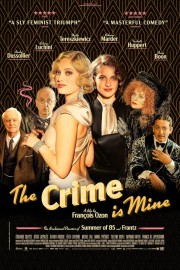The Crime is Mine
François Ozon is a wonderful trickster when he wants to be, and “The Crime is Mine” is him in full trickster mode. Eschewing the heavy emotions of “Everything Went Fine” and “By the Grace of God,” this is a dark comedy about the desire of two women to game the system to get out of poverty, and the system really seems like it will allow them. I’ve read comparisons to “Chicago,” and that’s in there, to be sure, but it’s more of a straight farce about how tabloid culture infects the way celebrity is gained. I found myself entertained every step of the way.
We first see Madeleine Verdier (Nadia Tereszkiewicz) leaving the extravagant home of movie producer Montferrand in a hurry. We do not see nor hear anything suspicious. We next see her come home, where her friend and roommate, Pauline Mauléon (Rebecca Marder), is talking with their landlord, hoping to get an extension on the rent they owe. While Madeleine and Pauline are an actress and lawyer, respectively, neither one is successful at their jobs. Madeleine tells Pauline about a potential offer Montferrand gave her to make a lot of money, but it’s not the type of offer that an actress wants to get from a producer. Not long after, a police detective comes to them, saying that the producer is dead. Madeleine is wanted for questioning, and makes herself the prime suspect. The events to follow make an unlikely opportunity for Madeleine and Pauline to get out of poverty, and find success at last.
The play Ozon’s film is based upon is by Georges Berr and Louis Verneuil, and it, undoubtedly, has some wild twists of logic to it as it builds to its themes of celebrity, and the romanticization of murderers in the press, and in life. At a time where social media makes for cult-like devotion of celebrities, whether what they’re known for is good or bad, the film Ozon and his co-writer, Philippe Piazzo, have made is deliciously satirical of how we build parasocial relationships with certain people. Madeleine has a boyfriend in the film, André (Édouard Sulpice), the son of a tire magnate. Their relationship is a fascinating one even before Madeleine makes herself the prime suspect in Montferrand’s death; afterwards, the dynamics change, but not in the way you’d expect in a story like this, so much so that when Madeleine meets her prospective father-in-law (André Dussollier), we’re almost taken aback by matters. That is where Ozon’s devious side shines, though; he understands the silliness this story contains, and is allowing us to have fun with it even if we find ourselves questioning our own reasons if we follow these characters to their natural resolution.
This film reminds me a lot of Ozon’s 2003 erotic thriller, “Swimming Pool,” in how it portrays women in control of their sexuality, and how they come together for one another. Though not as explicit as the earlier film, seeing the ways in which Madeleine and Pauline work together, and even find themselves having to work with an older woman with her own hand to play (Odette Chaumette, an aging actress played with delightful verve by Isabelle Huppert), make for a fun ride in how the characters will work their way through the situation. Add to that Fabrice Luchini as the judge on the case, and this case seems to be moving sideways on all fronts. The period costumes and production design for the film’s 1930s France setting, and the lush cinematography, make the film’s dark underlying story feel all the bouncier and more engaging. The MVPs, however, are the trio of women and Ozon himself, who isn’t afraid to give us a story of murder and celebrity that is wickedly fun to watch.










